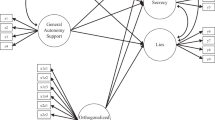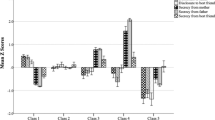Abstract
Drawing upon the social domain theory regarding adolescents’ information management and the model of family change on cultural orientation toward self-construal development, this qualitative study investigated Singaporean adolescents’ emotional disclosure and secrecy with parents in their negotiation of the development of self-construal. Eighty-two adolescents aged 11–19 described their negative emotional disclosure and secrecy in relation to three factors: (1) the social contexts of emotional experiences, (2) the justifications for disclosure and secrecy, and (3) parents’ reactions. Four contexts of emotional experiences, three overarching categories of justifications, and three primary types of parental reactions were identified. Singaporean adolescents’ emotional disclosure and secrecy examined through the confluence of three factors revealed the processes, successes and challenges associated with the development of autonomous-related self. Findings lend credence to the connection of the social domain theory and model of family change—specifically, the confluence of three factors involving the domains of information, justifications and parental reactions in understanding adolescents’ negotiation of self-construal development through the management of their emotional lives in developed Asian societies with an emphasis on academic achievement. Importantly, results revealed that Singaporean parents need to make adaptations in the way of their autonomy-granting for developing adolescents’ self-reliance within the school context and have implications for education stakeholders in helping adolescents develop a healthy sense of self.
Highlights
-
Singaporean adolescents’ emotional disclosure and secrecy surrounded four contexts: school, peer, family and others.
-
Three overarching justifications included pragmatic motivations, relational concerns and developmental considerations.
-
Positive, negative and a combination of positive and negative parental reactions were identified.
-
A confluence of three factors revealed successes and challenges in adolescents’ development of autonomous-related self.
-
Adolescents’ self-construal in their emotional lives supports the social domain theory and the model of family change.
Similar content being viewed by others
References
Bakken, J. P., & Brown, B. B. (2010). Adolescent secretive behavior: African American and Hmong adolescents’ strategies and justifications for managing parents’ knowledge about peers. Journal of Research on Adolescence, 20, 359–388. https://doi.org/10.1111/j.1532-7795.2010.00642.x.
Chao, R., & Tseng, V. (2002). Parenting of Asians. In M. H. Bornstein (Ed.), Handbook of parenting: Social conditions and applied parenting (2nd ed., pp. 59–93). Mahwah, NJ: Erlbaum
Darling, N., Cumsille, P., & Peña-Alampay, L. (2005). Rules, legitimacy of parental authority, and obligation to obey in Chile, the Philippines, and the United States. New Directions for Child and Adolescent Development, 108, 47–60. https://doi.org/10.1002/cd.127.
Darling, N., Cumsille, P., Peña‐Alampay, L., & Coatsworth, D. (2009). Individual and issue‐specific differences in parental knowledge and adolescent disclosure in Chile, the Philippines, and the United States. Journal of Research on Adolescence, 19, 715–740. https://doi.org/10.1111/j.1532-7795.2009.00608.x.
Department of Statistics Singapore. (2010). Census of population 1208 2010. Retrieved from http://www.singstat.gov.sg/publications/1209publicationsand-papers/population/census10_admin.
Hunter, S. B., Barber, B. K., Olsen, J. A., McNeely, C. A., & Bose, K. (2011). Adolescents’ self-disclosure to parents across cultures: Who discloses and why. Journal of Adolescent Research, 26, 447–478. https://doi.org/10.1177/0743558411402334.
Kagitcibasi, C. (2017). Family, self, and human development across cultures. New York: Routledge.
Keijsers, L., & Laird, R. D. (2010). Introduction to special issue. Careful conversations: Adolescents managing their parents’ access to information. Journal of Adolescence, 33, 255–259. https://doi.org/10.1016/j.adolescence.2009.10.009.
Krippendorff, K. (2012). Content analysis: An introduction to its methodology. London: Sage.
Larson, R. W., Moneta, G., Richards, M. H., & Wilson, S. (2002). Continuity, stability, and change in daily emotional experience across adolescence. Child Development, 73, 1151–1165. https://doi.org/10.1111/1467-8624.00464.
Noller, P., & Callan, V. J. (1990). Adolescents’ perceptions of the nature of their communication with parents. Journal of Youth and Adolescence, 19, 349–362. https://doi.org/10.1007/BF01537077.
Nucci, L., Smetana, J., Araki, N., Nakaue, M., & Comer, J. (2014). Japanese adolescents’ disclosure and information management with parents. Child Development, 85, 901–907. https://doi.org/10.1111/cdev.12174.
OECD (2015). PISA 2015. Results (Volume III): Students’ well-being. PISA. Paris: OECD Publishing. 10.1787/9789264273856-en.
Pennebaker, J. W., Zech, E., & Rimé, B. (2001). Disclosing and sharing emotion: Psychological, social, and health consequences. In M. Stroebe, W. Stroebe, R. Hansson, & H. Schut (Eds.), Handbook of bereavement research: Consequences, coping, and care (pp. 517–543). Washington, DC: American Psychological Association. https://doi.org/10.1037/10436-022
QSR International. (2012). NVivo 10 [Computer software]. Retrieved from http://www.qsrinternational.com
Quah, R.S. (2016). Singapore families: Stability and diversity in challenging times. In M. Mathews & W.F. Chiang (Eds.), Managing diversity in Singapore: Policies and prospects (pp. 265-297). London: Imperial College Press. https://doi.org/10.1142/9781783269549_0011
Racz, S. J., & McMahon, R. J. (2011). The relationship between parental knowledge and monitoring and child and adolescent conduct problems: A 10-year update. Clinical Child and Family Psychology Review, 14, 377–398. https://doi.org/10.1007/s10567-011-0099-y.
Rimé, B., Finkenauer, C., Luminet, O., Zech, E., & Philippot, P. (1998). Social sharing of emotion: New evidence and new questions. European Review of Social Psychology, 9, 145–189. https://doi.org/10.1080/14792779843000072.
Saukko, P. (2017). Methodologies for cultural and social studies in an age of new technologies. In N. Denzin & Y. Lincoln (Eds.), The sage handbook of qualitative research (pp. 464–487). Los Angeles: Sage Publications.
Singh-Manoux, A., & Finkenauer, C. (2001). Cultural variations in social sharing of emotions: An intercultural perspective. Journal of Cross-Cultural Psychology, 32, 647–661. https://doi.org/10.1177/0022022101032006001.
Smetana, J.G. (2017). The development of autonomy during adolescence: A social-cognitive domain theory view. In B. Soenens, M. Vansteenkiste & S. Van Petegem (Eds.), Autonomy in adolescent development: Toward conceptual clarity (pp. 53–73). New York, NY: Routledge.
Stattin, H., & Kerr, M. (2000). Parental monitoring: A reinterpretation. Child Development, 71, 1072–1085. https://doi.org/10.1111/1467-8624.00210.
Tan, C. (2012). “Our shared values” in Singapore: A Confucian perspective. Educational Theory, 62, 449–463. https://doi.org/10.1111/j.1741-5446.2012.00456.x.
Tilton-Weaver, L. (2014). Adolescents’ information management: Comparing ideas about why adolescents disclose to or keep secrets from their parents. Journal of Youth and Adolescence, 43, 803–813. https://doi.org/10.1007/s10964-013-0008-4.
Tilton-Weaver, L., Kerr, M., Pakalniskeine, V., Tokic, A., Salihovic, S., & Stattin, H. (2010). Open up or close down: How do parental reactions affect youth information management? Journal of Adolescence, 33, 343–346. https://doi.org/10.1016/j.adolescence.2009.07.011.
Author information
Authors and Affiliations
Contributions
G.H. Y. designed and executed the study, conducted data analyses, and wrote the paper.
Corresponding author
Ethics declarations
Conflict of Interest
The author declares no conflict of interest.
Ethical Approval
All procedures performed in studies involving human participants were in accordance with the ethical standards of the institutional research committee ([Blinded] Institutional Review Board; reference number: 13-188) and with the 1964 Helsinki declaration and its later amendments or comparable ethical standards. This article does not contain any studies with animals performed by any of the authors.
Informed Consent
Informed consent was obtained from all individual participants included in the study.
Additional information
Publisher’s note Springer Nature remains neutral with regard to jurisdictional claims in published maps and institutional affiliations.
Supplementary Information
Rights and permissions
About this article
Cite this article
Yeo, G. Emotional Disclosure and Secrecy in the Development of Autonomous-Related Self among Singaporean Adolescents. J Child Fam Stud 30, 350–363 (2021). https://doi.org/10.1007/s10826-021-01899-2
Accepted:
Published:
Issue Date:
DOI: https://doi.org/10.1007/s10826-021-01899-2




